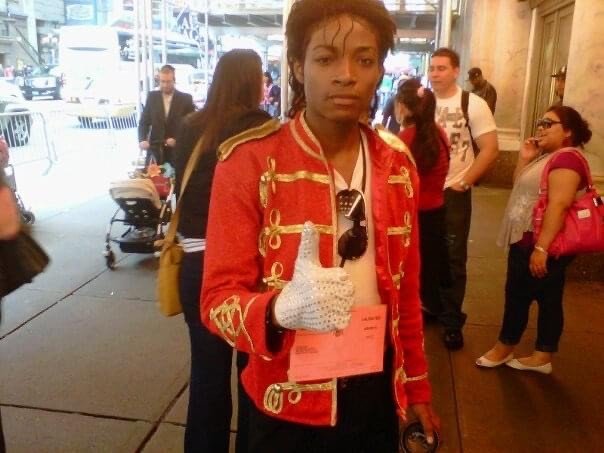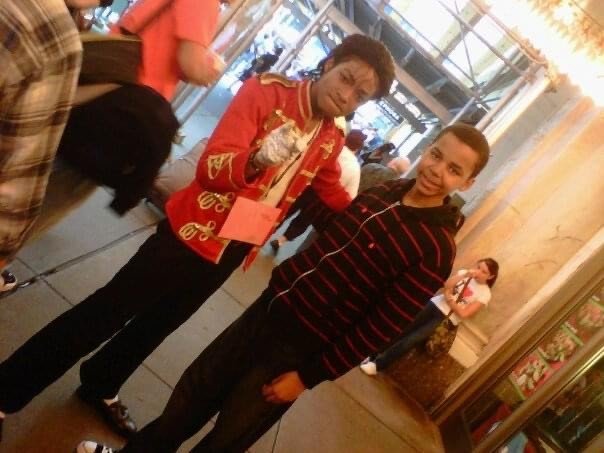Who was Jordan Neely? Friends recall ‘sweet kid,’ talented performer killed in subway chokehold.
May 4, 2023, 3:28 p.m.
Friends, family and outreach workers remember a talented dancer and performer devastated as a teen by the murder of his mother.

The 30-year-old Black man killed on the subway after another passenger put him in a lethal chokehold Monday is being remembered for his talent, spark and tenacity by the family, friends and outreach workers who knew him.
Jordan Neely was well known to many New Yorkers as a moonwalking Michael Jackson impersonator who danced on the subways and platforms since as early as 2009. His charismatic performances masked deepening struggles with mental illness that friends and family say were accelerated by a lack of stable housing and his mother's brutal murder at the hands of her abusive boyfriend when Neely was just 14.
Neely's death, which was recorded by another straphanger and posted on social media, has sparked outcry among some elected officials and everyday New Yorkers as the city struggles to house its homeless residents and provide services to people with severe mental illness.
Larry Malcolm Smith, Jr. said he got to know Neely in foster care roughly a decade ago and considered him a big brother who shared the money he made dancing so that the other kids could afford food or a haircut.
“This was a good guy,” Smith said. “He would be in the New York City train station using his God-gifted ability and talent.”
Smith said New Yorkers may focus on his recent struggles with mental illness, homelessness and violent encounters with other subway riders — he was reportedly arrested multiple times in recent years — but those problems seemed to be symptoms of a tough childhood marked by his mother’s devastating murder.
“I just want people to know the positives,” Smith said, adding that Neely was failed by the very systems meant to ensure young people have stable homes and steady mental health treatment. “Jordan could have been housed but nobody cares.”
As a teen, Neely lived in Bayonne, New Jersey, just south of Jersey City, according to reporting on his mother’s death in 2007. More than four years later, he testified at the murder trial of her killer — an abusive boyfriend who strangled her to death and dumped her body off a Bronx highway. Neely told the court he realized something was wrong when his mother did not wake him for school as she usually did and when her boyfriend blocked him from entering their bedroom, NJ.com reported at the time.
Melyssa Votta, a tattoo artist in Canarsie, said she and Neely became friends in high school when he dated her good friend. By that time, Neely was in New York City and “having issues with where he was living,” she said.
“He was really such a sweet kid, he just had a bad time,” Votta said.
She said they would spend time together at Union Square Park and in a nearby McDonald’s.
“We would always hang out there. He was a regular kid,” she said, before describing his passion for performance.
“He had this dream of being the dancer that he was,” she said. “He made it happen.”

Neely’s father Andre Zachery could not be reached for this story. He told the Daily News that Neely was devastated by his mother's murder.
“He loved her so much that he just lost it,” Zachery told the Daily News. “After we buried her, he just wasn’t the same anymore.”
A woman who identifies as Neely’s aunt Carolyn Neely set up an online fundraiser calling for justice in the wake of the killing. Police released the unidentified white man who placed Neely in the chokehold that killed him, and he has not yet been charged with a crime.
“I love my nephew Jordan Neely, he was a very talented Black man who loves to dance,” Carolyn Neely wrote. “Performance was his thing.”
She has not yet responded to phone calls and Facebook messages.
Outreach workers tasked with helping homeless New Yorkers enter shelter and find permanent housing frequently spoke with Neely at some of the locations where he was known to stay, including the Oculus at the World Trade Center and the sidewalks around the Bowery, said Christopher Joyner, a case manager with the organization The Bridge.
Joyner said Bridge staff recently began building a stronger relationship with Neely, who discussed his experiences growing up and later staying in shelters and public spaces. Neely was a client with the organization BRC and occasionally stayed in the organization’s shelters, according to workers.
Joyner said he and his colleagues had hoped to connect Neely with the housing and services he needed.
“He was a decent guy,” Joyner said outside a BRC shelter Thursday morning. “Definitely a guy I looked forward to working more with.”
Joyner said that Neely, like many people living in public spaces, was resilient.
“He was pushing. He was a survivor,” Joyner added. “He was very innovative, as most people on the streets are.”
BRC Executive Director Muzzy Rosenblatt would not confirm or deny whether Neely was a client of the organization, citing confidentiality rules, but he said the organization serves many people with similar needs who are too often subjected to violence.
“People in a situation like Jordan’s are the people we serve,” Rosenblatt said.
Last fiscal year, at least 15 homeless New Yorkers were killed, according to an annual deaths report from the city’s Social Services and Health Departments. All told, 815 people died while homeless last year — the highest death toll recorded by the city.
The city’s medical examiner listed Neely’s cause of death as strangulation on Wednesday and ruled it a homicide — a medical term that does not necessarily lead to criminal charges. The Manhattan district attorney is investigating Neely’s death after police released the man who choked Neely while two others held his arms as he struggled, according to a video posted on social media.
“We have to question why this tragedy occurred. And why our society far too often dehumanize Black people and people with mental health challenges,” Rosenblatt said. “While experiencing another person’s mental health crisis can feel scary, that is no justification for the taking of another person’s life.”
Bahar Ostadan contributed reporting.